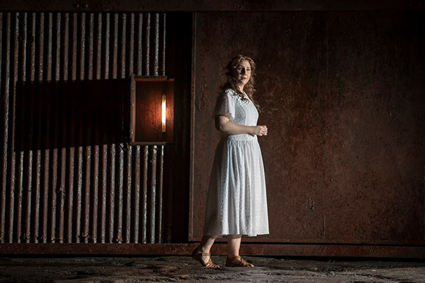| Opera Reviews | 20 April 2024 |
Death on the Volgaby Catriona Graham |
|
| Janacek: Kátya Kabanová
Scottish Opera March 2019 |
|

Laura Wilde (Kátya)
|
|
|
Why do so many operatic heroines so clearly have mental health issues? Take Kátya Kabanová, Janacek’s exploration of the working of Fate. Spoiler alert! When the curtain rises on Scottish Opera’s co-production with Theater Magdeburg, directed by Stephen Lawless, we see a muddy river-bank, where people with torches surround the white-clad body of a woman. A man covers her with his coat, while an older woman approaches and holds him. A rust-red iron bridge descends, with parallel walkways which pedestrians cross purposefully, or meeting friends and stopping to chat. As Vanya and Boris do, helpfully filling us in on the backstory. Local life happens round the bridge – when the weather changes, pedestrians struggle against the wind, and local drunks shelter under it. Counter-intuitively, the driving love-triangle is husband-mother-wife. Kabanicha is jealous of Kátya, complaining that Tikhon loves his wife more than his mother – well, doh! Without that, would Fate have worked? Patricia Bardon is a glamorous Kabanicha, soignée in black, managing the factory where the other women work and sending Tikhon (Samuel Sakker) to Kazan for a month; he refuses to take his wife with him, and doesn’t take seriously her sense of foreboding. Varvara, the daughter, is carving out her own life – Hanna Hipp does a quick change from frumpish work-clothes to short leather skirt, ankle boots and off-shoulder jumper before she meets Vanya for an evening dip in the Volga. She sets up Boris to meet Kátya after she has revealed an interest in a long and rambling account of how generally unhinged she is, with a bit of religious mania. Kabanicha is not all she should be, as her encounter with Boris’s drunken uncle Dikoy shows. Paul Whelan’s comic turn provides a lighter mood after Kátya’s lyrical angst. There’s a moment of levity on the river bank while Vanya waits for Varvara. Tristan Llyr Griffiths has brought his guitar and whiles away the time by singing a song, with rock-guitarist moves. When Boris and Kátya finally meet in the reed-beds, Wilde communicates the uncertainty, conflicting emotions and desires besetting a woman whose home circumstances are not helping her underlying problems. The denouement comes when Tikhon returns and, obsessed with the enormity of her sin, Kátya blurts out her affair. In meltdown, she runs off, encountering Boris while others search the reed beds with torches. Even then, there is no happy ending so she throws herself off the bridge, thus bringing us back to the beginning. Lesley Travers’ set invokes a grubby industrial landscape, enhanced by Christopher Akerlind’s lighting and those purposeful pedestrians directed by Lynne Hockney. Stuart Stratford and the orchestra catch the light and the birdsong in Janacek’s score. The singing is relaxed and conversational and the story ripples along with only a slight concern that we are enjoying watching a mentally ill woman disintegrate.
|
|
| Text © Catriona Graham Photo © James Glossop |
|







